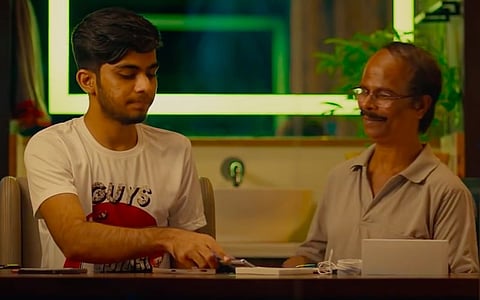
- Reviews
- Power List 2024
- Cannes 2024
- In-Depth Stories
- Web Stories
- News
- FC Lists
- Interviews
- Features
- FC SpecialsFC Specials

Director: Rojin Thomas
Cast: Indrans, Sreenath Bhasi, Vijay Babu, Manju Pillai, Neslin, Kainakary Thankaraj, KPAC Lalitha
Language: Malayalam
Oliver Twist (Indrans), the Pixar character-like father in #Home, is an anachronism in every sense of the word. He once ran a successful video cassette library which had to be shut down because he couldn't keep up with changing times. He now lives in a big, modern house made of glass and metal but that's the creativity of his son, an architect, who has now detoured to filmmaking. Oliver's home office is filled with hundreds of these cassettes along with equally outdated things like a broken gramophone, a boom box and a landline telephone. Placed within the context of this modern house, we see the alienation Oliver feels in a world that has left him far behind. Like in his professional life, he struggles to keep up with his family too as they change faster than he can.
His older son Antony (Sreenath Bhasi) is the architect-turned filmmaker while his younger brother is trying his luck at another kind of beast—Youtube. Add to this list Oliver's father, who once worked as a stenographer, and the film shows us how technology shaped the careers of three generations of the same family. The generational difference we see among them also gives us a very timely reminder—that all our jobs will one day become obsolete.
Using technology as the talking point, #Home pushes us deep into a father-son story that a lot of us will relate to. We feel this in the way Oliver struggles to switch from the front camera to the back camera when he's asked to click a picture. We've also seen older family members using notebooks to learn functions on the smartphone like it's a course that needs revision. But what's most evident is the way Antony reacts to his father when he asks Antony the simplest of questions. Antony has time to share his opinions on Facebook but he struggles to hold a five-minute conversation with his father. He gets annoyed at the simplest of things and we see him go through writer's block where he's being unfair to his work and his family.
But #Home isn't the usual cautionary tale that blames technology for everything that's wrong with millennials, when seen through the eyes of a boomer. Instead it uses the father-son story to give us two varying viewpoints and two contrasting arguments in the same technology debate. Through Oliver, we see how technology can make one's life easy, especially as one gets older. But through Antony, we see the other extreme of what social media can do to the creative mind. Between constant comparisons and ego trips, the film reminds us that we all need to press the 'home' button every once in a while.
Most of what the film speaks about are topics we already know, told in a manner we've already seen before. But the performances make sure there's an emotion we connect to or a joke that never lets the film become too big for its shoes. The brightly-lit world with cheery music gives us the feeling that we're in a Hallmark store where nothing can go wrong. The problems feel manageable and we never get the sense that something big is at stake.
These are all solid qualities for a happy family drama set inside the walls of this home. But with too many strands and too many ideas, the film loses the focus with which the first hour played out. From Oliver's tryst with technology, the film has to then make room to accommodate Antony's troubled creative process, his financial issues, a brewing class conflict between Antony and his girlfriend's family and also Oliver's feeling that his life is nothing but ordinary.
Add to this an angle about a psychologist lecturing us on the issues of technology and we get a flabby movie that does not justify its two hour forty minute runtime. Still, driven by the performances, we could still have been left with a sweet film with a "good heart" except that its ending feels too much like a déjà vu for it to matter. We see traces of Kadha Parayumbol here and the way this portion is written feels too predictable to leave us with a surprise. And for a film with so many lovely moments, one wonders why we get another tired stereotype of the nagging, whiny girlfriend who keeps bugging her boyfriend. Other than to see the character as a social media age update of Urvasi's character in Midhunam, the character feels too out of place in such a film.
Thanks to the severely heartwarming performances of Indrans and Manju Pillai, who plays his wife, we get a film that's always watchable, even if it has nothing new to offer. And for a film about changing technology, #Home is a film that appeals to the most primitive part of our hearts.